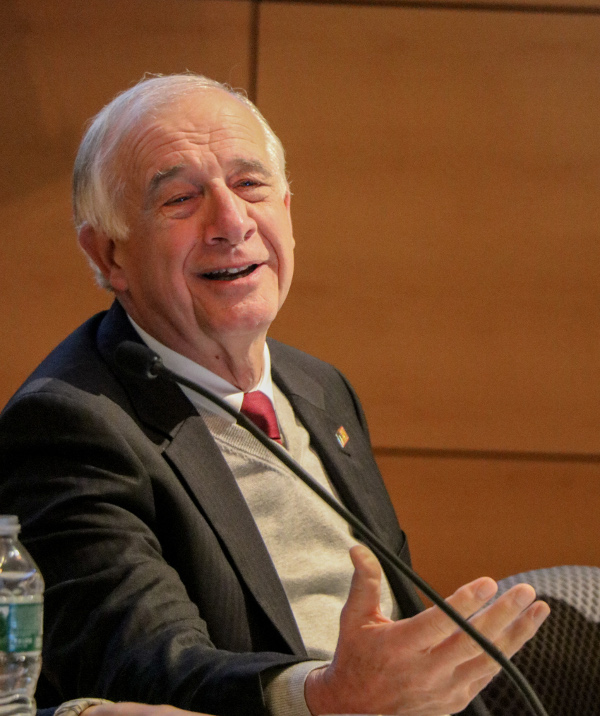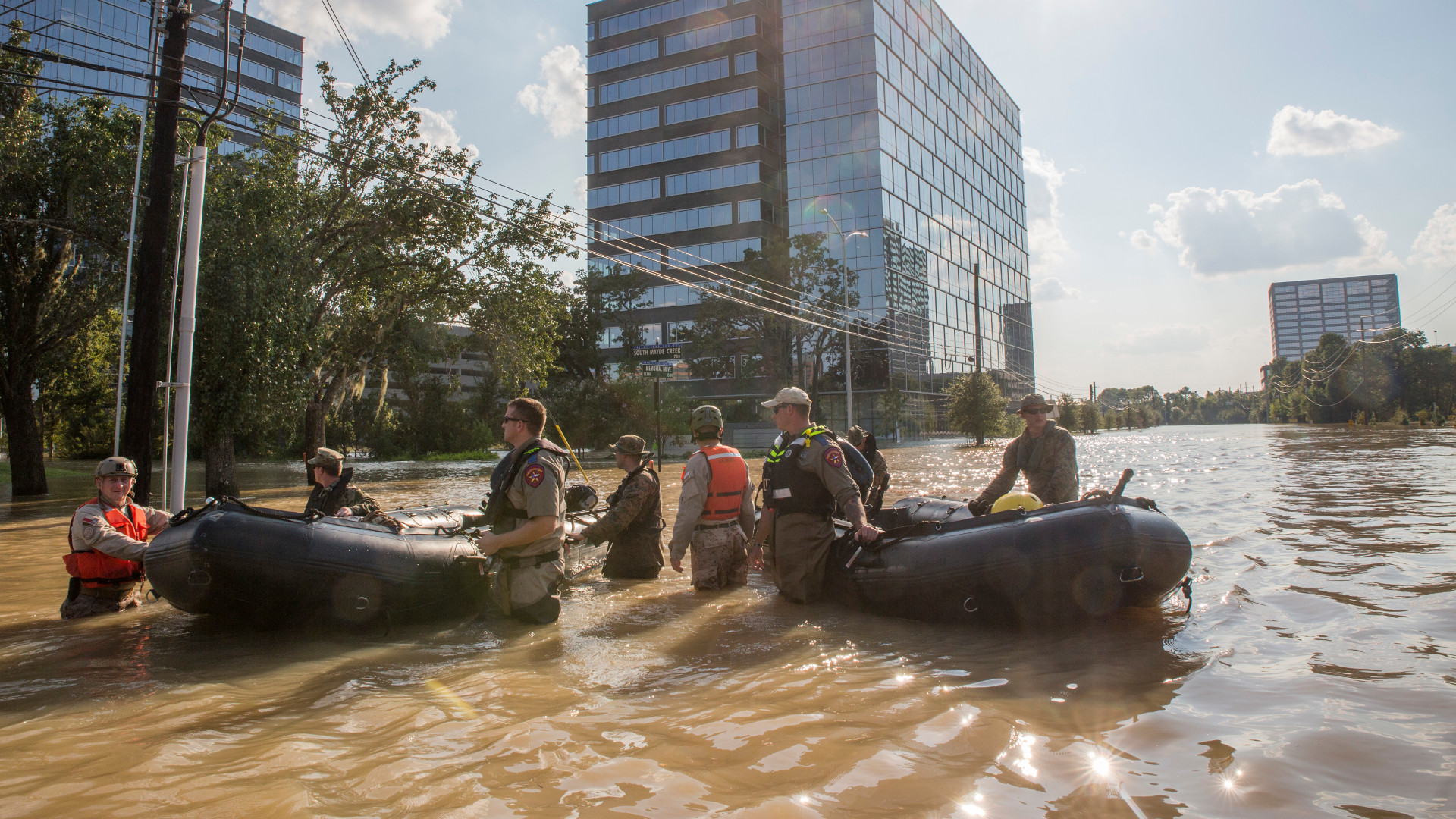How does the U.S. military and intelligence community perceive the threat of climate change? Last week I sat down with retired Lieutenant General John G. Castellaw of the U.S. Marine Corps to explore this and other questions.
Lt. Gen. Castellaw is a member of the Center for Climate & Security Advisory Board and also sits on the board of the American Security Project. Because of his affiliation with these nonpartisan organizations, Castellaw was adamantly tight-lipped on the topic of President Trump dramatically slashing the budget for environmental programs across the country, including ones for which Castellaw himself has voiced support.

Castellaw represents a minority of conservative thinkers that recognizes climate change as a serious threat, but believes that the free market is equipped to solve the crisis. Considering that major corporations are the some of the largest accelerants of climate change, and that a former coal industry lobbyist was recently appointed as deputy administrator to the Environmental Protection Agency (right behind Scott Pruitt, a climate-change denier who is actively dismantling environmental regulations), it’s understandable why some might reduce Castellaw’s stance to mere wishful thinking.
Nevertheless, because of his 36-year experience leading marines around the world — often in flood-and drought-prone regions that are on the front lines of the climate crisis — Castellaw offers a sobering perspective on this international issue. Here’s my exchange with him, lightly edited for grammar and clarity.
Do people in the military and intelligence community view climate change as a serious threat?
When I was in a commander I was responsible for everything that happened in my battle space.
What I did was what all commanders do, something called intelligence preparation of the battlefield. Basically, you determine what the threats are. It may be enemy armor or aircraft. But we also look at weather and terrain. Climate change and its impacts, extreme weather events, increasing sea levels, all of those are threats that military leaders are considering.
Every military guy is going to do that, regardless of their political affiliation. They’re trained to take those threats seriously. And anybody who disregards those threats is stupid. It’s science; it’s a fact. You disregard those solid threats at your own peril.
What is about your military experience that informs your stance on climate change?
As Marines we’re trained to look at things in an unemotional, fact-based way. We like stability, certainty and order. What we try to prevent is instability, uncertainty and chaos.
And so when you start looking at the factors that generate instability, uncertainty and chaos, you start to see various threats associated with climate change.
Take the Lake Chad basin [in Africa] for example. I went there first in the ’90s to do planning for a non-combative operation. Americans were in the middle of a potential coup going on and needed to be escorted out. When I entered the countryside and flew over Lake Chad I saw a lot of fishermen using the lake — 150,000, believe it or not. Herdsmen were there, and crops were being grown.
But last year, when I went back, I learned that the lake is 10 percent of what it was in 1960. I saw dry land where people were fishing last time. Migration problems arose from the diminishing resources.
The cattle herdsmen that were moving into different areas were often times in open conflict with farmers. [They were] killing each other over resources. And during that time we saw extremists like Boko Haram taking advantage of the chaos, recruiting, generating money, and attacking ever more areas down there.
Eventually, because we have economic, diplomatic and strategic relationships with those countries, when those countries are undermined, our relationship with them, and ergo our national security, is undermined.
Analyze the facts and you get to this point: Climate change is a serious threat to our national security.
Have you traveled to coastal areas that have raised similar types of concerns?
Yes. Recently we did a study on the sea-level rise in the United States and its impact on military installations.
Portsmouth Naval Shipyard was founded in 1800, and is only one of four. It has a very specific mission: The people there are working on nuclear submarine modifications and refurbishment. It’s a very important facility in our national defense. Our studies show that by 2050, it’s going to see an increase in flood tides affecting the industrial areas on the western side of the complex — the crane tracks, the docks, various facilities. This will significantly hinder the facility’s ability to accomplish its mission.
By the end of the century the water-level rise will be so severe that the island itself may be bisected.
The impact that sea-level rise and climate change are going to have on our economy and national defense will be felt across the country.
We’re going to have to deal with it, but at the same time if we keep waiting, the bill is going to keep climbing.
How serious a threat is climate change when ranked with other perceived apocalyptic threats like nuclear war or terrorism?
When you’re a cattle herder or fishermen or a farmer in the Lake Chad basin, it’s the most serious thing in the world.
What do you make of the budget cuts to the EPA and the attempt to remove the phrase climate change from its website?
What I can tell you is that where I am is at the deck plate. I’m around the farmers. I sat around a table with a group of farmers and agronomists not long ago, and what they’re worried about is the shortening of the growing season and the extreme weather events.
Just like in the military, the farmers are going to do what’s necessary to preserve their economic well-being.
Are you against the budget cuts to the EPA?
I’m for things that reduce greenhouse gases and emissions from power plants. Cleaner car fuel-economy standards. Scientific measures, common sense economical moves like switching from coal to natural gas. Increasing the use of sustainable energy.
It’s just difficult to determine if those policies/regulations would even pass with so many climate-change deniers in Congress.
We’ve passed the tipping point already. We’re going to continue to move toward renewable energy because it makes sense, it’s economically viable and it’s not a political move.
But what do you make of the fact that more than half of our lawmakers in Congress are climate-change deniers, and the commander in chief doesn’t seem to consider climate change a top security priority?
My job is to make sure that my position is the one that carries the day.
That’s a very diplomatic answer. But wouldn’t more investment in the EPA for example help neutralize the threats associated with climate change at this point?
As I’ve said, I think we’ve already reached a tipping point. A lot of stuff that supports the environment is making economic sense. And if anything else that’s going to push us in the right direction. There are right-leaning people out there pushing for market-based solutions. We [free market conservatives] don’t like a lot of government intervention. What we like is to do things that make sense and what’s in our best interest, and that’s what I’m seeing now. The momentum that’s built over the past 20 years will continue to grow.
Won’t it be an uphill battle to get corporations and climate-change deniers to care about ameliorating the crisis?
In the Marine Corps, we’ve always had uphill battles; it’s part of the challenge of life. When you look at a problem like climate change, the best thing to do is charge up that hill, because it’s the right thing to do.
© 2018 Francis Flisiuk. All rights reserved.


